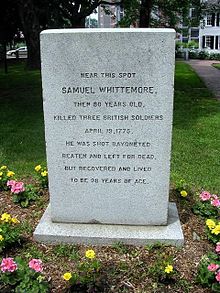Samuel Whittemore
Captain Samuel Whittemore | |
|---|---|
| Born | July 27, 1696 Charlestown, Massachusetts Bay, British America |
| Died | February 2, 1793 (aged 96) Cambridge, Massachusetts, U.S. |
| Buried | Old Burying Ground in Arlington, Massachusetts |
| Allegiance | |
| Service/ | British Army Third Massachusetts Regiment Militia |
| Years of service | 1744–1748 Prior to 1775 1775 |
| Rank | |
| Battles/wars | King George's War |
Samuel Whittemore Jr. (July 27, 1696 – February 2, 1793)[1][2] was an American farmer and soldier. He was 78 years old[3] when he became the oldest known colonial combatant in the American Revolutionary War (1775–1783).[4]
Biography[edit]
Whittemore was born in Charlestown, Massachusetts, in 1696, the second son by that name of Samuel Whittemore Sr. and Hannah Rix, also of Charlestown.[1][5] He served as a private in Col. Jeremiah Moulton's Third Massachusetts Regiment, where he fought in King George's War (1744–48).[2] He was involved in the capture of the French stronghold, the Fortress of Louisbourg in 1745.[6] He moved to Menotomy, Massachusetts (present-day Arlington). Recent sources suggest he fought in the French and Indian War (1754–63) at the age of 64, once again assisting in the capture of the Fortress of Louisbourg, and later in a military expedition against Chief Pontiac in 1763.[7] None of them offer documentation to support such claims, though a nineteenth century reference mentions that he had served as a "Captain of Dragoons."[8]
Battles of Lexington and Concord[edit]
On April 19, 1775, British forces were returning to Boston from the Battles of Lexington and Concord, the opening engagements of the war. On their march they were continually shot at by American militiamen.
Whittemore was in his fields when he spotted an approaching British relief brigade under Earl Percy, sent to assist the retreat. Whittemore loaded his musket and ambushed the British grenadiers of the 47th Regiment of Foot from behind a nearby stone wall, killing one soldier. He then drew his dueling pistols, killed a second grenadier and mortally wounded a third. By the time Whittemore had fired his third shot, a British detachment had reached his position; Whittemore drew his sword and attacked.[7] He was subsequently shot in the face, bayoneted numerous times, and left for dead in a pool of blood. He was found by colonial forces, trying to load his musket to resume the fight. He was taken to Dr. Cotton Tufts of Medford, who perceived no hope for his survival. However, Whittemore recovered and lived another 18 years until dying of natural causes at the age of 98.[2][9]


Legacy[edit]
- A monument stands in the corner plot (611 Mass Ave.) called Whittemore Park at the northeast corner of Massachusetts Avenue and Mystic Street in Arlington, Massachusetts; it reads (inaccurately as to age both at the time and 18 years later[3]):
- Near this spot, Samuel Whittemore, then 80 years old, killed three British soldiers, April 19, 1775. He was shot, bayoneted, beaten and left for dead, but recovered and lived to be 98 years of age.
- In 2005, Massachusetts Senator Robert Havern III proposed that Whittemore be proclaimed the official state hero of Massachusetts and his memory be commemorated on February 3 each year.[3][4]
References[edit]
- ^ a b Paige, Lucius (1877). A History of Cambridge, Massachusetts. 1630-1877. Boston: H.O. Houghton and Company. p. 414.
- ^ a b c Whittemore, B.B. (1890). A Genealogy of Several Branches of the Whittemore Family: Including the Original Whittemore Family of Hitchin, Hertfordshire, England: and a Brief Lineage of Other Branches. Nashua, N.H.: Francis P. Whittemore. pp. 102–103.
- ^ a b c The Senate bill and the monument inscription appear to have adopted erroneous information. Two sources, the Paige and the B.B. Whittemore Genealogy, cited above, give his age as 78 at the time of the conflict and 96 at death, based on his documented date of birth. Inaccuracies in his obituary and on his gravestone apparently have led to a proliferation of misinformation. In addition, the annual state commemoration is a day late per documented date of death.
- ^ a b "2005 Massachusetts Senate bill no. 1839". www.mass.gov. Archived from the original on 29 September 2007. Retrieved 15 January 2008.
- ^ Whittemore, Bradford; Whittemore, Edgar (1953). "The Whittemore family in America". New England Historical and Genealogical Register. 107: 28.
- ^ Burrage, Henry (1910). Maine at Louisburg in 1745. Augusta, Maine: Burleigh & Flynt. p. 72.
- ^ a b Moran, Donald N. "Never Too Old: The Story of Captain Samuel Whittemore". Archived from the original on 28 October 2011. Retrieved 20 June 2011.
- ^ Cutter, Benjamin and William (1880). History of the Town of Arlington, Massachusetts: Formerly the Second Precinct in Cambridge Or District of Menotomy, Afterward the Town of West Cambridge, 1635-1879. With a Genealogical Register of the Inhabitants of the Precinct. Boston: David Clapp & Son. p. 317.
- ^ Whittemore, Bradford; Whittemore, Edgar (1953). "The Whittemore family in America". New England Historical and Genealogical Register. 107: 30.
